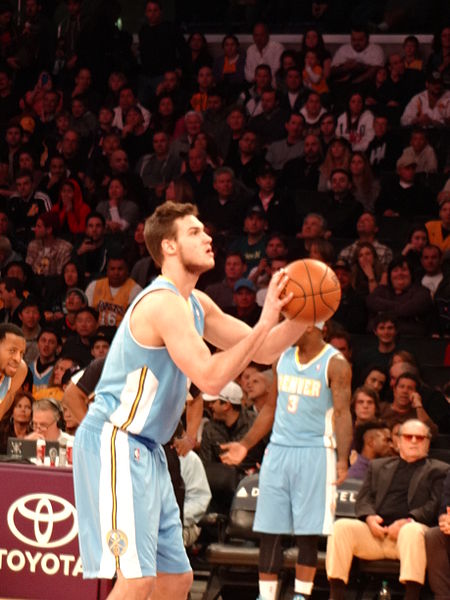

Overpaid Athletes- Part I
We all know athletes make too much money. This is hardly a revelation, but somehow I cannot help but be startled each time I hear details of the latest contract another vastly overpaid athlete has just signed, presumably using ink made from the tears of the children that stitch the shoes they endorse for Nike. The numbers are truly staggering, leading me to wish I wasn’t a 5’8” white guy with almost no vertical leap. Instead my talent set is better suited for writing a two-part series on the impact these overwhelming salaries have on our economy and our culture in general.
The one that got me all fired up to write this piece was the recent contract negotiations surrounding middling Denver Nuggets forward Danilo Gallinari. Not exactly a household name, Gallinari averages 17 points a game for a team that is under .500 and unlikely to make the playoffs. He is the epitome of average in every conceivable way. But in the surrealistic world of NBA salaries, being average pays handsomely, so handsomely in fact, that the average NBA athlete made $6.2 million for the 2016-2017 season. But that’s not what Gallinari is looking for in his contract demands. While his current contract guarantees him $17 million if he stays with Denver next season, most experts expect him to opt out of the deal so that he can enter the free market where he would be likely to command a deal closer to the 4 year, $94 million deal that Chanlder Parsons got from Memphis last year. That’s right- we’re talking $23 million per year for Danilo frickin’ Gallinari, a guy most people wouldn’t be able to pick out of a police lineup. Yeah, I am definitely in the wrong profession.

The reason these contracts continue to skyrocket is directly tied to the escalating revenue these sports bring in. Since 2001, NBA revenue has risen from 2.66 to 5.87 billion dollars. The players and owners split that pie on a close to 50/50 basis in almost all of the major professional sports, but let’s face it, that’s a pretty damn big pie. Much of that comes from network television contracts and merchandising rights, but it is also tied to ticket prices and attendance. And that is where this story takes a turn for the worse.
Because when we hear about our local sports franchise, we often want them to spend money on high-priced free agents whom we hope can push the team over the hump to being a bona fide championship contender. Take Gallinari, for example. Even though he has never even been the best player on a Nuggets squad that hasn’t made the playoffs during his tenure with the team, folks in Denver are lobbying the front office to pony up the cash needed to keep him here. They may grumble that Gallinari makes too much, but make no mistake that they will rip the team for being “cheap” if they do not find a way to pay him what he wants. This creates a false dichotomy that suggests we must either side with owners or players in a scenario that really seems fairly unseemly either way.
This paradigm that informs every collective bargaining agreement in sports labor negotiations suggests that the money is already pouring in, and it is thus just a matter of how millionaire players and billionaire owners will divide that money amongst themselves. As fans, we feel torn between two groups who both seem grossly overpaid. Perhaps you side with owners because they built the franchise up in the first place. Perhaps you side with players because that’s who we really pay the money to see anyways. Either way, you know you are standing up for the financial interest of somebody who makes a hell of a lot more money than you could ever dream of.
But notice that nowhere in this equation is there a single mention of the fan, the one who pays the salaries of both. That’s what makes this a false dichotomy because there is, believe it or not, a third option for where all this money could be going. But neither the players nor the owners want you to consider that possibility because that third option is to put more of that money back into the pockets of the fans. Go ahead and call me a crazy whackadoodle commie, but perhaps instead of increasing the salaries of guys making millions to play a kids’ game eighty nights a year or lining the pockets of billionaires, just perhaps, we could lower ticket prices so that more fans would be able to attend games with their family and friends.
Have you been to a sporting event recently? If so, you either are far wealthier than most of us or you have taken out a daunting second mortgage on your house. The median price for a ticket to an NBA game rose 3.4% this year to $53.98. That’s well over two-hundred bucks to take a family of four, and that doesn’t even include the $50 in ticket service charges, $15 for parking, $8 cheeseburgers for your kids, and $12 beers you and your wife will want to consume to forget about all the money you just threw down the drain. But hey, that’s cheap compared to the NFL. Their average ticket price is $84.43. Still think I’m crazy to think that owners and players should give some of that money back to the fans?
But of course they won’t because this is America where free market capitalism dictates that businesses charge whatever the market will bear. So what if we started telling them that this market will no longer bear this price gouging? What if we collectively stopped giving them our hard-earned money and instead stayed home and spent time with our kids playing board games and watching the games on television? If we stopped attending sporting events and drove revenue numbers down, franchises would be compelled to lower ticket prices so that, ironically, we could all afford to go to games again. But hey, I don’t have to worry about that. I live in a town with the Nuggets, Avalanche, and Rockies. And none of us want to go see that.
Steven Craig is the author of the best-selling novel WAITING FOR TODAY, as well as numerous published poems, short stories, and dramatic works. Read his blog TRUTH: in 1000 Words or Less every THURSDAY at www.waitingfortoday.com




The fault, dear Brutus, is not in the stars. But in ourselves that we are the underlings.
Always count on fellow author Jerry Fabyanic to class up the place by quoting Shakespeare! Thanks for reading, my friend…